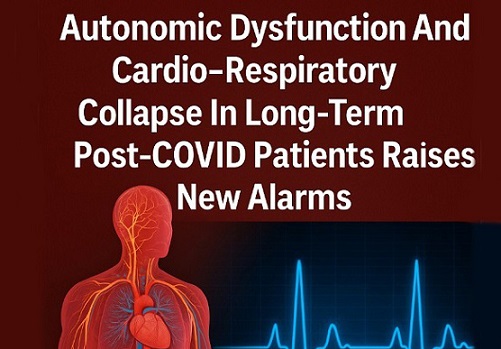Autonomic Dysfunction and Cardio Respiratory Collapse in Long-Term Post COVID Patients Raises New Alarms
Nikhil Prasad Fact checked by:Thailand Medical News Team May 10, 2025 9 months, 3 days, 22 hours, 18 minutes ago
Medical News: Researchers Discover How Long COVID Can Quietly Damage the Nervous System and Undermine Physical Capacity Without Obvious Warning Signs
In a disturbing new development, scientists from the Medical University of Sofia in Bulgaria have discovered that many people suffering from long COVID are actually facing a hidden but serious health problem—autonomic nervous system dysfunction that silently chips away at their physical capacity. Even more concerning, these impairments often go unnoticed in regular medical checkups but can drastically affect the heart’s ability to respond to stress and exercise.
 Autonomic Dysfunction and Cardio Respiratory Collapse in Long-Term Post COVID Patients Raises New Alarms
Autonomic Dysfunction and Cardio Respiratory Collapse in Long-Term Post COVID Patients Raises New Alarms
The joint research effort was conducted by experts from the Respiratory Intensive Care Unit at University Hospital “St Ivan Rilski,” the Clinic of Cardiology at the Hospital of the Ministry of Interior, the Clinic of Respiratory Diseases at the University Hospital “St Ivan Rilski,” the Department of Physiology and Pathophysiology, the Clinic of Internal Diseases at First University Hospital “St John-The Baptist,” and the Chemistry and Biochemistry Department of the Medical University Sofia. The findings are particularly alarming as they show that autonomic dysfunction and reduced cardio-respiratory fitness can persist for over two and a half years after the initial COVID-19 infection. This
Medical News report aims to explain the research in a way that all readers can understand.
Long COVID Is Not Just Fatigue and Brain Fog
Although millions have recovered from the acute phase of COVID-19, a large portion continue to report debilitating symptoms months or even years later. These symptoms include overwhelming fatigue, dizziness, shortness of breath, exercise intolerance, and brain fog. But what lies behind these symptoms?
According to the researchers, the culprit could be a form of autonomic nervous system (ANS) failure, a condition that disrupts the body’s ability to regulate involuntary functions like heart rate and blood pressure. Two specific indicators of this dysfunction are chronotropic incompetence—the inability of the heart to increase its rate appropriately during exercise—and abnormal heart rate recovery—the failure of the heart to return to a resting rate after exertion.
The Study Setup
In this detailed study, researchers examined 192 individuals who had previously tested positive for COVID-19, most of whom were employed and clinically stable. All participants had their infection at least a year before the study, and none had severe heart or lung diseases that might confound the results.
Out of these, 47 individuals were still suffering from persistent symptoms, even up to 30 months after their initial illness. Based on their symptom severity, these long COVID patients were grouped into mild and moderate-to-severe categories. Another 48 individuals who had recovered and reported no sympt
oms served as the control group.
Each participant underwent a rigorous cardio-pulmonary exercise test (CPET) and completed a Chronic Fatigue Syndrome Questionnaire. The researchers also used precise tools to assess lung function, heart performance, and oxygen use during exercise.
Striking Findings on Autonomic Dysfunction
The results were eye-opening. Among the patients with moderate-to-severe long COVID:
-Over 81% exhibited chronotropic incompetence
-33% had abnormal heart rate recovery
-Only 63% had preserved physical fitness
-51.8% could not reach their anaerobic threshold during exercise
-Even among mildly symptomatic individuals, 35% showed signs of autonomic dysfunction. In contrast, only 12.5% of the asymptomatic control group had similar issues.
Interestingly, none of the groups—regardless of symptom severity—showed problems with their lungs such as ventilatory reserve depletion, dynamic hyperinflation, or oxygen desaturation during testing. This suggests that their breathlessness and fatigue were not due to lung damage but more likely due to neurological and cardiovascular factors controlled by the ANS.
The Missing Piece in Long COVID
The study also highlights a curious mismatch: while 81.5% of the moderate-severe long COVID group showed autonomic nervous system dysfunction, only 37% of them had significantly reduced cardio-respiratory fitness. This gap implies that while autonomic dysfunction is very common, its exact role in reducing physical performance is complicated and may vary from patient to patient.
According to the researchers, the autonomic nervous system affects not just the heart but also the brain, blood vessels, and muscles. Thus, disruptions can lead to a wide range of problems—ranging from mental fog and mood issues to physical weakness and breathlessness. These disruptions might involve a mix of immune responses, inflammation, nerve damage, and even microscopic changes in how muscles and mitochondria function.
Real World Impact and Importance
What makes this study crucial is its focus on people who were not hospitalized during their acute COVID phase and had no pre-existing health issues. This means that even relatively mild cases of COVID-19 can lead to long-term autonomic problems that are hard to detect but deeply disruptive.
The study also confirms that standard lung and heart tests may not catch these problems, and special assessments like CPET and autonomic function tests may be necessary to fully understand what long COVID patients are experiencing.
A Call for Awareness and New Approaches
The researchers believe their findings could open new doors for better care and diagnostics for long COVID patients. Treatments that specifically target the autonomic nervous system or aim to improve heart rate responses during exercise may help restore quality of life for many who are still struggling.
They also stress the importance of not dismissing persistent symptoms like fatigue, dizziness, or shortness of breath—especially if standard tests come back normal. These issues could be a sign of a deeper, nervous system-related dysfunction that requires more specialized care.
The study findings were published in the peer reviewed journal: Biomedicines.
https://www.mdpi.com/2227-9059/13/5/1138
For the latest on Long COVID, keep on logging to Thailand
Medical News.
Read Also:
https://www.thailandmedical.news/news/covid-19-news-study-finds-that-most-post-covid-individuals-who-only-had-mild-infections-suffer-from-asymptomatic-autonomic-dysregulation
https://www.thailandmedical.news/news/covid-19-alters-hrv-disrupts-autonomic-regulation-increases-sympathetic-and-reduces-parasympathetic-activity
https://www.thailandmedical.news/news/long-term-cognitive-and-autonomic-effects-of-covid-19-in-young-adults
https://www.thailandmedical.news/articles/coronavirus
https://www.thailandmedical.news/articles/long-covid
https://www.thailandmedical.news/pages/thailand_doctors_listings
